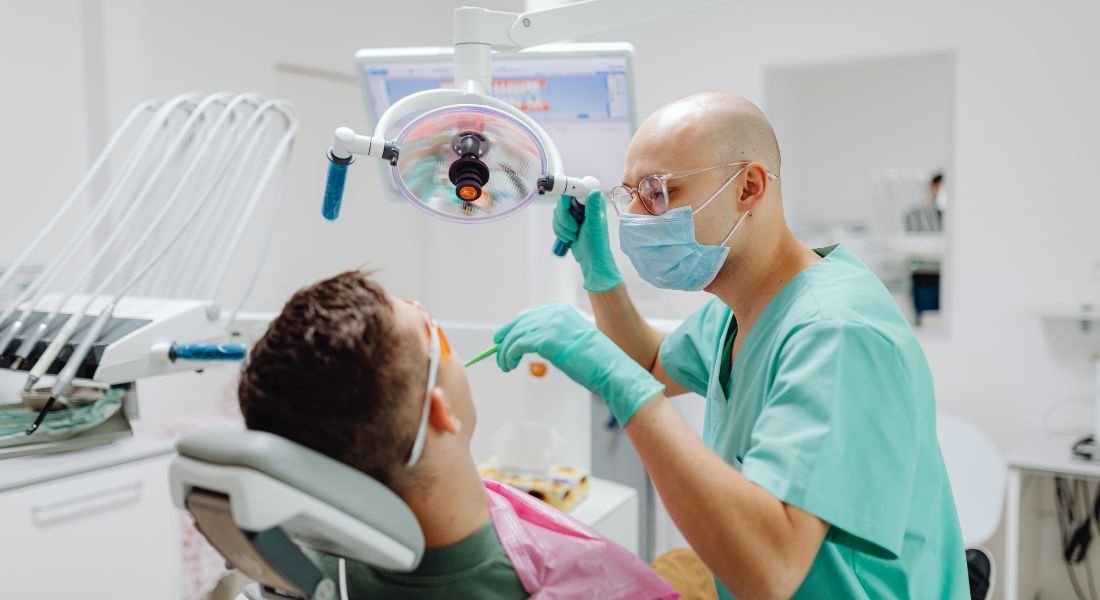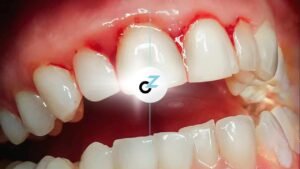Oral health goes beyond aesthetics and cavity prevention. Many people are unaware that gum problems can affect the entire health of the body, and one of the most serious conditions related to the gums is periodontitis. This inflammatory disease can lead to tooth loss and is associated with a range of other health complications, including heart disease, diabetes, and even respiratory issues. The good news is that with proper knowledge, it is possible to prevent, diagnose, and treat periodontitis effectively. In this article, we will explore the causes of this condition, its consequences, and the best treatment options, as well as discuss how knowledge plays a crucial role in prevention.
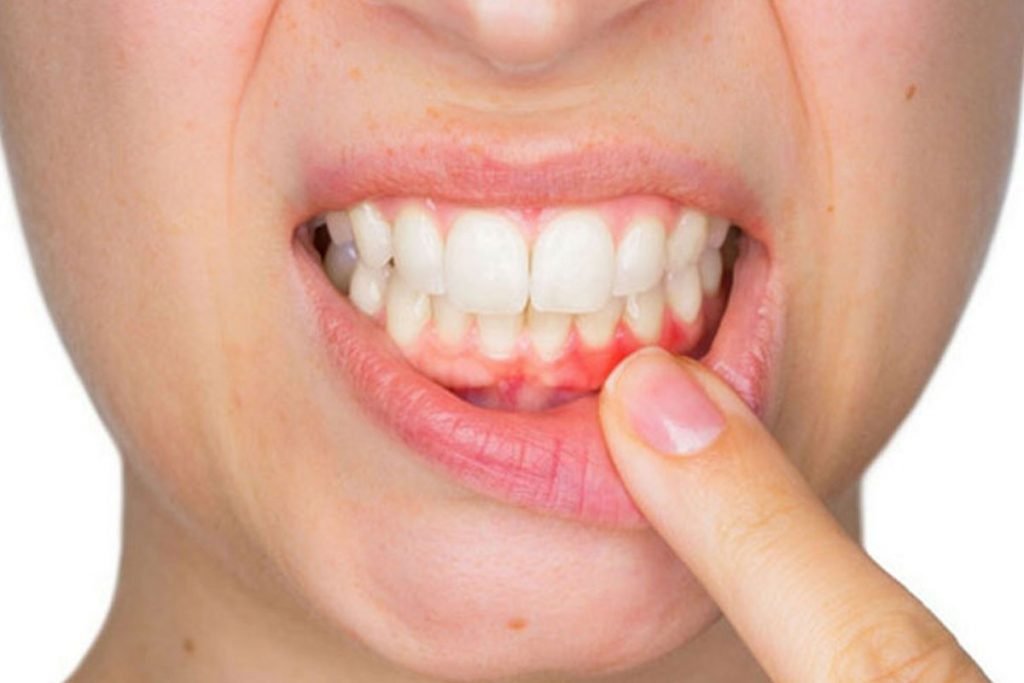
What is Periodontitis?
Periodontitis is a severe gum infection that affects the tissues supporting the teeth, such as the periodontal ligaments and bone. It occurs when gingivitis — a milder form of gum inflammation — goes untreated and progresses into a deeper infection, severely impacting oral health. Unlike gingivitis, which can be reversed with good oral hygiene, periodontitis can cause permanent damage, such as tooth loss.
There are two main stages of periodontal disease:
- Gingivitis: Inflammation of the gums, typically characterized by redness, swelling, and bleeding when brushing or flossing. It is the early stage of the disease and can be treated easily with proper oral care.
- Periodontitis: If left untreated, gingivitis can progress into periodontitis, where the infection spreads to the deeper tissues of the mouth, leading to destruction of the bone around the teeth, tooth mobility, and eventually tooth loss.
What Causes Periodontitis?
The primary cause of periodontitis is bacterial plaque, a sticky layer of bacteria that constantly forms on the teeth and gums. If not effectively removed through brushing and flossing, plaque turns into tartar, which can only be removed by a dentist. The presence of tartar makes it easier for bacteria to proliferate, resulting in inflammation, bleeding, and, if left untreated, the destruction of periodontal tissues.
Other factors that may contribute to the development of periodontitis include:
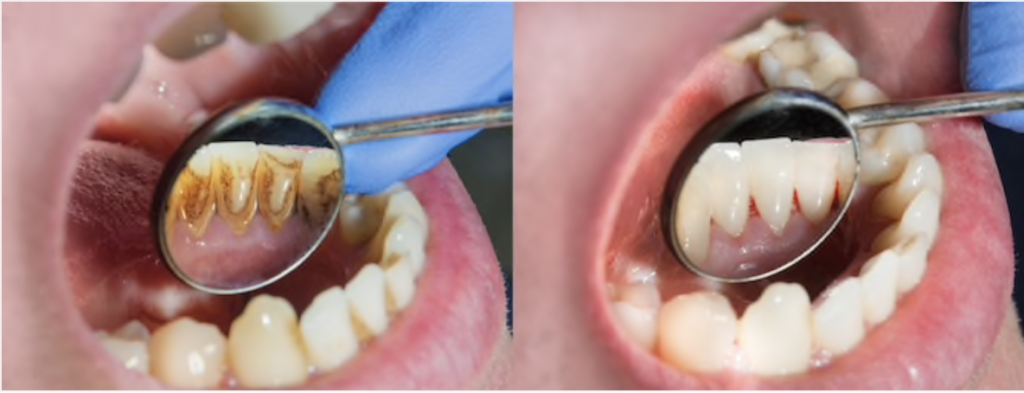
1. Poor Oral Hygiene
Improper brushing and lack of flossing are the leading causes of plaque and tartar buildup. When cleaning is not done properly, bacteria accumulate, causing inflammation in the gums.
2. Genetic Factors
Genetics can influence the severity of periodontal disease. Some people are more susceptible to developing severe gum disease, even with proper care.
3. Smoking
Smoking is one of the biggest risk factors for periodontitis. Tobacco use harms the blood circulation in the gums, impairing the body’s ability to fight infections and accelerating the destruction of periodontal tissues.
4. Chronic Diseases
Conditions like diabetes, HIV/AIDS, and heart disease can weaken the immune system, making the body more vulnerable to infections like periodontitis. Additionally, diabetes can increase the risk of gum infections, making it harder for the body to fight inflammation.
5. Hormonal Changes
Hormonal changes, such as those occurring during pregnancy, menopause, or as a result of using birth control pills, can make the gums more sensitive and prone to developing periodontal diseases.
6. Stress

Stress can weaken the immune system and increase inflammation in the body, contributing to the development of periodontitis.
7. Poor Diet
A diet high in sugar and simple carbohydrates can feed the bacteria that cause plaque buildup. Deficiencies in essential nutrients, such as vitamin C, can also harm gum health.
8. Medications

Certain medications can affect oral health by reducing saliva production, making the mouth more susceptible to infections. Medications that cause dry mouth, such as antidepressants and antihypertensives, can increase the risk of periodontitis.
Symptoms of Periodontitis
Periodontitis can develop without causing noticeable symptoms in the early stages, which makes early diagnosis more difficult. However, over time, the disease may cause symptoms such as:
- Red, swollen, and painful gums
- Bleeding gums when brushing or flossing
- Persistent bad breath (halitosis)
- Loose or separated teeth
- Changes in bite
- Pain while chewing
- Presence of pus between teeth and gums
If you notice any of these symptoms, it is crucial to see a dentist as soon as possible. Early diagnosis of periodontitis can prevent irreversible damage to the teeth and supporting tissues.
Treatments for Periodontitis
The treatment for periodontitis depends on the stage of the disease and the severity of the infection. The primary goal is to control the infection and prevent tooth loss. Treatments may include:
1. Deep Cleaning (Scaling and Root Planing)
In the early stages, professional cleaning, also known as scaling and root planing, may be sufficient to remove plaque and tartar below the gumline. This procedure helps eliminate bacteria and smoothens the tooth roots, promoting gum healing.
2. Antibiotics
In some cases, a dentist may prescribe antibiotics to help control the infection. These can be taken orally or applied directly to the affected gums.
3. Periodontal Surgery
If periodontitis has advanced to a severe stage, periodontal surgery may be required. Various surgical procedures include flap surgery (to clean areas that are difficult to reach) or bone grafts (to repair the bone damaged by infection).
4. Laser Therapy
Laser therapy is a less invasive option for treating periodontitis. The laser is used to remove inflamed tissue and destroy bacteria in the periodontal pockets, promoting gum healing.
The Power of Knowledge in Prevention
The best way to handle periodontitis is through prevention. Knowledge about the disease and preventive care can help avoid severe complications in the future. Education about oral hygiene is key to prevention.
1. Proper Brushing
Brushing your teeth at least twice a day with fluoride toothpaste is essential. Brushing should be done gently in circular motions to avoid harming the gums.
2. Use of Dental Floss

Dental floss is vital for removing plaque between the teeth and below the gumline — areas that a toothbrush cannot reach. Daily flossing can significantly reduce the risk of gum disease.
3. Regular Dental Visits
Visiting a dentist regularly for routine checkups and professional cleanings is crucial for early detection of gum disease. A dentist can perform scaling and root planing to remove accumulated tartar.
4. Healthy Diet
Maintaining a balanced diet, rich in nutrients such as vitamins C and D, can strengthen the gums and help prevent periodontal diseases. Limiting the intake of sugar and carbohydrates is also important.
5. Avoid Smoking
Smoking is one of the biggest risk factors for periodontitis. Quitting smoking can significantly reduce the risk of developing severe gum disease.
6. Control of Systemic Diseases
People with chronic diseases like diabetes should manage their condition to reduce the risk of oral complications. Proper management of systemic diseases can improve gum health.
Conclusion
Periodontitis is a serious condition that affects not only oral health but also overall health. Understanding its causes, symptoms, and treatments is essential for preventing long-term damage, such as tooth loss. Knowledge is undoubtedly one of the most powerful tools in preventing this disease. By adopting healthy oral hygiene habits, seeking regular professional care, and educating yourself about risk factors, it is possible to maintain the health of your gums and teeth throughout life.
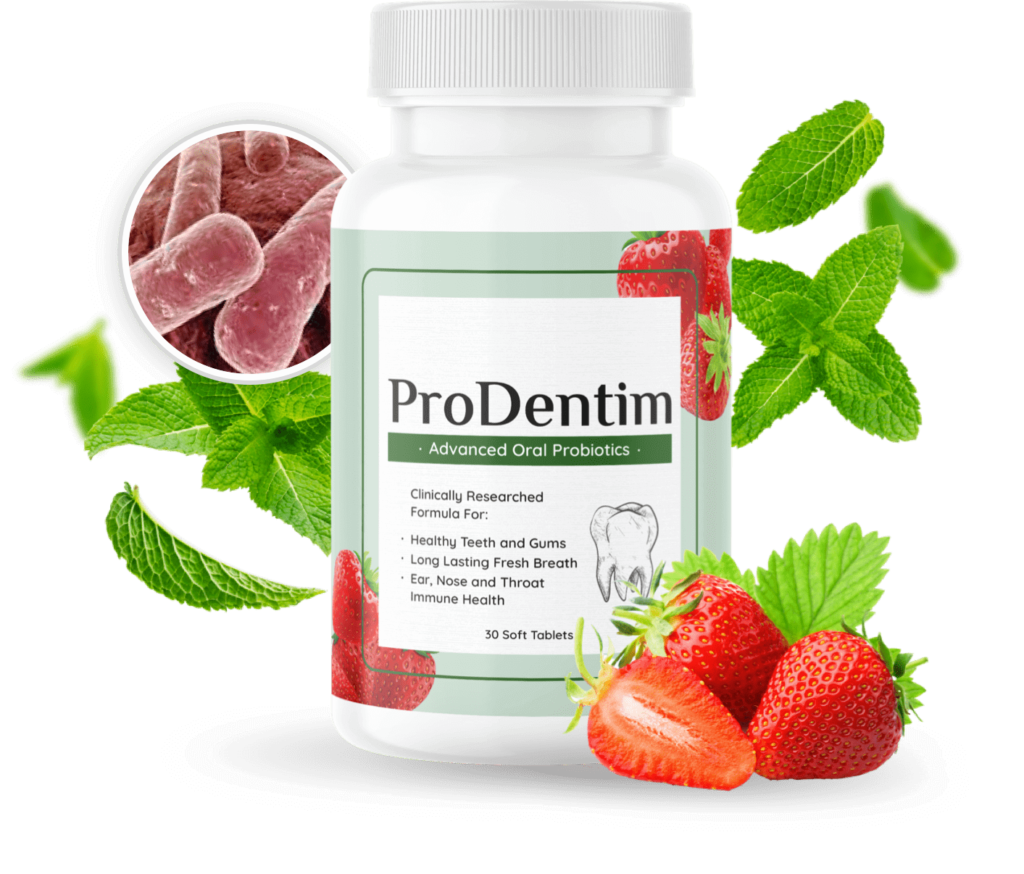
Prodentin is a type of dietary supplement designed to support oral health, particularly focused on promoting tooth regeneration and maintaining gum health. It is commonly marketed as a supplement that can help prevent dental problems such as cavities, gingivitis, and periodontitis, while also strengthening teeth and improving gum health.
The main feature of Prodentin is that it contains a combination of ingredients like probiotics, vitamins, and minerals, which aim to balance the oral microbiome and support dental health from the inside out. Some of the key ingredients in the product include:
Key Ingredients of ProDentin:
- Probiotics: These live microorganisms help balance the bacteria in the mouth, which can be beneficial for fighting harmful bacteria that cause periodontal diseases and cavities. Probiotics may help reduce the growth of pathogenic bacteria while promoting the growth of beneficial bacteria.
- Vitamin D: Vitamin D is essential for calcium absorption, a vital mineral for dental and bone health. Vitamin D also supports the immune system, helping the body fight inflammation, including that caused by dental issues.
- Calcium and Phosphorus: These minerals are essential for remineralizing tooth enamel and maintaining the strength of teeth and bones. They help keep teeth strong and protected from wear and cavities.
- Vitamin K2: Vitamin K2 is associated with the formation of strong teeth and bone health, helping to regulate calcium metabolism and ensuring it is deposited correctly in the teeth and bones.
- Inulin: A type of dietary fiber that can promote digestive health and support the gut microbiome, which, in turn, may have positive effects on oral health. A balanced gut flora can influence the oral flora, benefiting oral hygiene.

